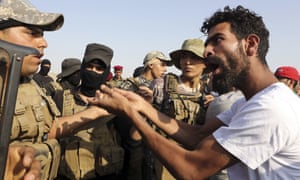The Iraqi Drug Quandary
"The government authorities are very shy in addressing this situation."
"They do not admit this problem because of the social traditions. Even the media is not discussing it."
Abbas Maher alSardi, mayor, Zubair, Iraq
 |
| In this Dec. 5, 2017, photo, blindfolded suspected drug dealers are displayed with their goods and weapons in a detention facility in Basra. (AP) |
And quite the situation it is. Good Iraqi Muslims becoming drug addicts. There is social shame associated with that, but perhaps what is materially more critical is that poverty results from drug abuse. In traditional Muslim families where the male of the family is the wage earner, that earning potential is disrupted to addiction and prison. Once imprisoned for the offence of being a drug abuser, there is a criminal record, and with that record no respectable business will hire such an offender. Poverty.
There are now thousands of meth addicts in Iraq where drug problems have always been rare. "If crystal is in front of you, you have to take it", states Hussein Karim, 32, reduced now to living in a windowless room with his wife, their three children and his disabled brother. It has been two years since he has taken drugs and he goes out of his way to avoid seeing anyone who might deal drugs. His employment possibilities as a heavy equipment operator in construction, then as a fighter for the Popular Mobilization Units is all in the past. No one will now look to hire him for a salaried job.
Basra province, the southernmost governorate in Iraq, is where the most serious of drug problems has arisen, with 1,400 people, mostly men, convicted of drug possession or sale, and mostly crystal meth. Over 6,800 people have been imprisoned nationwide according to Iraq's Supreme Judiciary Council. It's a start; the numbers involved nothing alarming for a country of 39 million people, and where mostly Basra and Baghdad, the capital have been struck.
 |
| Unemployed Iraqis confront riot police during a protest to demand jobs in Basra, where anti-narcotic officers say that the use of crystal meth is doubling year on year. Photograph: Nabil al-Jurani/AP |
Placing people in prison appears to be the only solution to the problem that community leaders and government officials can think of to deal with the growing problem. The shame associated with having a family member drug-dependent extends not only to the family but to society at large. Zubair is a city of 740,000 just north of Basra where drug use is particularly high among youth, many of them unemployed.
The government responds by dispatching dozens of police teams nightly to fan out across Basra province, to target users and dealers in an effort to expunge outward signs of the problem afflicting society. This drug imbroglio is only the latest phase of a long slide into criminality in the region. Beginning with the absence of Saddam Hussein, whose reins on 'law and order' ensured that few would risk stepping out of line. His criminality was the only kind permitted.
The drug situation was seen to emerge about seven years ago when gangs moved into the drug trade, handling large quantities of crystal meth available from neighbouring Iran where production labs had sprung up, according to the head of research for the UN drug agency. Iran has made an effort to close down those labs, seeing production moved to other countries. According to Judge Riyadh Abid al-Abass of the Bastra Criminal Court, drugs also filter in to Iraq from Saudi Arabia and Kuwait.
There are hints that Iraq's militias which came into being to fight the invasion of the Islamic State, known as the Popular Mobilization Units, have involved themselves in the drug trade. Prisoners claim some units work with the traffickers and have allies in the government. Those traffickers are somehow capable of eluding detection. Those that are caught have been able to escape from prison soon after capture and speculation over the role of the militias is rife.
 |
Hundreds of prisoners are crammed into holding rooms in police stations. The pungent odour of sweat, excrement and urine can be over-powering. The average duration of a prison term for first time offenders is typically 15 months. For the government of Iraq to claim that drug abuse is a new phenomenon, attributable to the downfall of Saddam Hussein removing his iron fist of control, and introducing criminal behaviour in the population is either naive or defensively evasive.
Fundamentalist Islamists like the Taliban control the cultivation of poppies and the production of opium in Afghanistan to fund their terrorist war in the country. Hezbollah in Lebanon, the crony militia founded and funded by the Islamic Republic of Iran, along with the terrorist group Hamas in Gaza all have octopus arms involved in the drug trade for fun and profit in the Americas. While these groups portray themselves as Muslim scholars whose lives are dedicated to Islam which forbids the use of drugs and alcohol, they traffic in it with verve and vigour.
 |
| Members of the Iraqi Kurdish security forces pour gasoline over a seized drug haul before they burn it in the northern city of Arbil in 2013. Photo: Safin Hamed / AFP |
Labels: Arrests, Baghdad, Basra, Drug Dependence, Iraq, Trafficking

<< Home